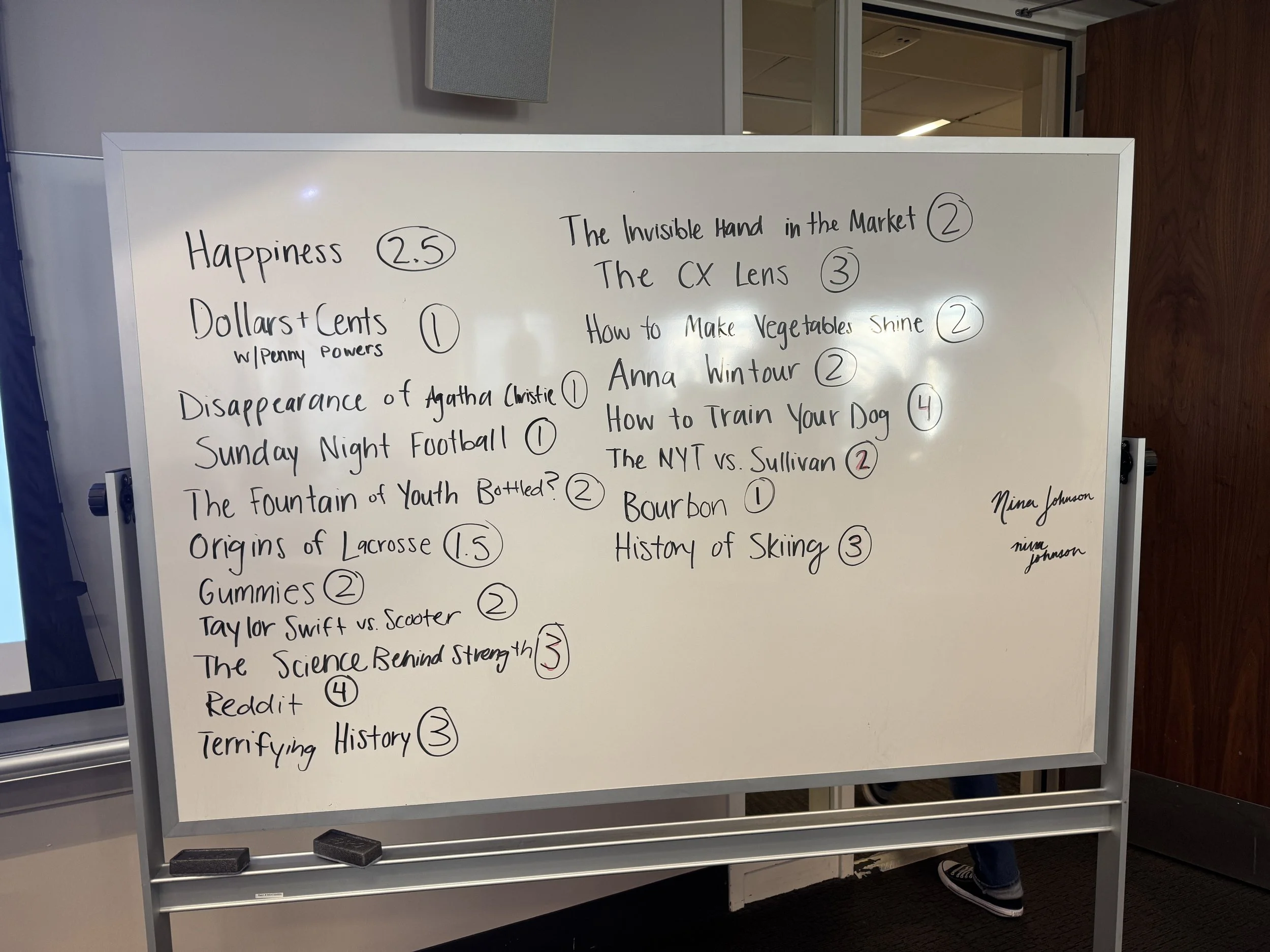What Happens When College Students Critique AI-Generated Podcasts
Some of the podcasts rated in my Business of Podcasting class
What happens when you ask a room full of college students to listen to AI-generated podcasts and rate them on a 1-to-5 scale?
You’re about to find out.
For my Business of Podcasting class at NYU, I invited my longtime friend and podcast research authority Tom Webster, Partner at Sounds Profitable, to join as a guest speaker. Tom led a terrific discussion on where the next generation of podcast listeners will come from — and we conducted a timely in-class experiment, turning the room into a mini focus group to explore how students reacted to AI-generated podcasts.
Each student selected an AI-generated show from Inception Point AI, a company churning out hundreds of machine-made episodes each week on every imaginable topic, from The Disappearance of Agatha Christie to How to Make Vegetables Shine. They chose one that looked interesting from roughly 450 available shows, gave it a listen and rating, with 1 being the lowest and 5 being the highest quality.
High scores were rare. Reddit and How to Train Your Dog managed to earn 4s. Most of the others hovered in the middle or lower.
The average was 2.3.
When Tom asked whether the students would have known the shows were AI-made if they hadn’t been told, several said yes. They felt the conversations were flat, too perfect, and oddly emotionless.
Interestingly, the few AI podcasts that fared better were instructional, like How to Train Your Dog or The Science Behind Strength. My students found these shows more acceptable because they didn’t expect personality; they just wanted information.
That said, even the students who appreciated the factual content missed the anecdotes, opinions, and credentials that human hosts use to build trust.
Tom, ever the researcher, pressed the group with a question: if the information is correct and useful, does it matter that it’s AI? Most said it does. Podcasts, they explained, are a human medium. They tune in for the voices, quirks, laughter, and even tangents.
As one student put it: “I listen to podcasts for the personality of the person — that’s what makes me care.”
Still, a few students argued that AI could help make podcasts more accessible or quickly cover niche topics. For them, it could be a supplement, not a replacement.
We also asked whether, for some of the more fact-based or list-driven AI shows, they would rather listen or simply read the same information. The answer was nearly unanimous. They would rather read it. Without the warmth, pacing, or personality that make podcasts engaging, a few students said it felt like having a Wikipedia page read aloud.
When we asked them to imagine what AI-generated podcasts might sound like five years from now, most agreed the technology will get better, possibly to the point of being too good. Some predicted AI will develop distinct personalities and sound more natural. Others worried that as it becomes more lifelike, AI could blur the line between authentic storytelling and synthetic imitation.
Also interesting, most felt the artwork “announced” the content was synthetic.
This experiment revealed a lot about the emotional DNA of podcasting.
1. Information alone isn’t enough. Human tone and authenticity matter just as much as content.
2. Transparency builds trust. Knowing whether a show is AI-made influences how it’s received.
3. AI works best for utility, not immersion. It’s most effective for short, factual explainers where warmth isn’t expected.
4. Human connection is still the differentiator. Voice, vulnerability, and lived experience are what keeps audiences coming back.
AI can write, read, and now talk. But can it connect? Our little NYU study suggests not quite yet. For now, the secret ingredient in every great podcast remains the same: a real human voice with something to say.
A big thanks to Tom Webster for joining me. His insights made this classroom experiment feel like a modern focus group with equal parts data, curiosity, and good humor. And a special thanks to my NYU students who dove right in on this topic bringing great perspective and comments.

